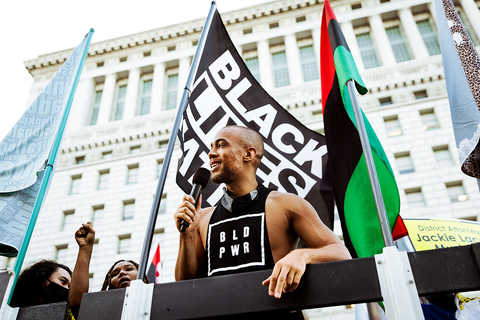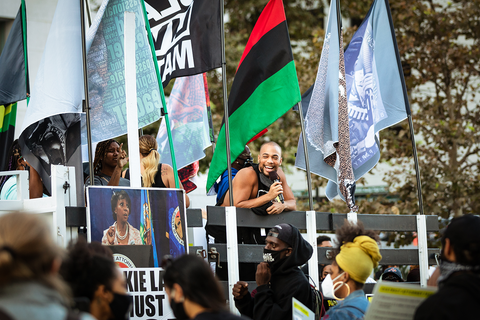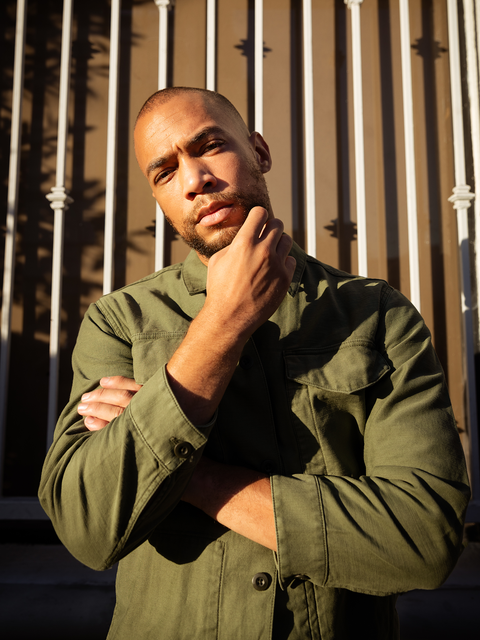Social Justice Definition in the Philippines
WHEN THE NATION erupted in the days after George Floyd's death, Kendrick Sampson, 32, was among the thousands marching through the streets. No stranger to demonstrations, the actor and activist pulled out his phone when Los Angeles Police Department officers moved in on a crowd dispersing after a May 30 protest. Sampson's cell phone, and CNN cameras, were filming as officers beat him with batons and fired seven rubber bullets into his body. He documented his injuries on Instagram and was back in the streets the next day, his bloody wounds covered with medical gauze.
When we first connect over Zoom in November, Sampson's physical wounds have long healed, but the mental trauma of a year roiled by a global pandemic and a racial reckoning still linger. "This was the most stressful year of all of our lives," he says.
We talk about the fight for liberation that fuels his activism, how he chooses to navigate Hollywood, and how he takes care of himself mentally and physically. You probably recognize Sampson from shows like The Vampire Diaries, How to Get Away with Murder, and Insecure. But in the past few years, his political activism has raised his profile beyond his work in television. In 2019, Sampson cofounded BLD PWR, a nonprofit organization working to dismantle racism in the entertainment industry as outlined in the call to action he wrote that was backed by more than 300 Black creatives and executives.
Before COVID-19 upended our lives, Sampson had planned to spend a chunk of 2020 shooting the ABC drama Thirtysomething(else) in New Jersey and flying out on off days for BLD PWR. "It was an intense schedule. I was about to be shooting every day . . . and sneaking out on the weekends to go campaign," he says. When the production was shut down due to the pandemic, he shifted completely to work on the movement.

Alexis Hunley
Born and raised in the Houston suburbs, Sampson moved to L. A. when he was 18. He joined the Robey Theatre Company, which focuses on staging productions centered on the Black American experience. Working with a Black theater troupe informed Sampson's purpose as an actor. Before he started booking gigs, he told his agent he wouldn't consider roles that promoted negative stereotypes of Black men or fed into narratives glorifying violence against Black bodies.
"To be completely honest, [too many] projects are trash," he says. "A lot of people are not in the industry . . . to be imaginative and artistic. They're not here to change the world. But I try to gauge the effect that I believe it will have on the culture, on liberation, and on my internal liberation journey."

Hearst Disney+
What pulled Sampson toward a character like Nathan on HBO's Insecure was series cocreator and executive producer Issa Rae's commitment to liberation through her work. The show films in south L. A.'s historically Black communities and often features Black-owned businesses and brands, collaborates with Black artists, and employs a wealth of Black creatives behind the scenes. Though viewers met Nathan as Rae's onscreen love interest, the character got an added layer of nuance in the most recent season when it was revealed he was struggling with bipolar disorder. Sampson's character and his own openness about battling debilitating anxiety sparked much-needed discourse around Black men and mental illness.

ALEXIS HUNLEY.
"I aim for [roles] to have a positive impact and be a part of liberation," he says. " 'Is it quality material?' and 'Do you like it?' are two different things." Sampson talks a lot about liberation, which makes me ask what it ultimately looks like for him. "Having a peaceful love of our communities and each other," he explains. "Everybody has proper health care. Everybody has access to a proper education and jobs that they love, where they feel they are supported, no matter what is their physical or mental ability. Another really big thing is no more cops. We have other systems that can replace law enforcement, that actually hold people accountable, empower us to be safe, and are specialized in safety, de-escalation, and care."
His engine for liberation is BLD PWR, which he cofounded with Tia Oso and Mike de la Rocha. It works at the intersection of grassroots organizing and narrative activism and has launched several initiatives, including Hollywood 4 Black Lives—which is focused on pushing the industry to divest from anti-Black content—as well as mental-health programming and a book club.

ALEXIS HUNLEY
Putting your body in the line of police violence the way Sampson has (and those on the front lines of protests have) comes with its own burdens, amplified by the isolation of life under lockdown. When he was younger, Sampson coped with anxiety by numbing himself with sex before the ulcers and muscle spasms manifesting in his body from stress provided a literal gut check. He admits he spent a bulk of lockdown struggling to handle the pressure. Seeing a therapist weekly taught him to be more mindful about making time for his needs—like getting a healthy amount of sleep every night and fitting in prayer and meditation. He also exercises four or five times a week, sometimes squeezing in a workout after he's marched through the streets for hours.
"I'd rather be as effective as I possibly can be in everything I do, and do it excellently, than do a bunch of things mediocre and be stressed out by that anxiety," he says. "I've really been trying my best to strategize for my health and my peace while also strategizing for liberation, my career, and my family. . . . Funny enough, and it may sound contradictory, but through all the chaos, I found a much clearer understanding of how to organize my life, be more effective, and live healthy."
This story appears in the January 2021 issue of Men's Health.
Gerrick Kennedy Gerrick Kennedy is an award-winning journalist, cultural critic, and author living and working in Los Angeles.
This content is created and maintained by a third party, and imported onto this page to help users provide their email addresses. You may be able to find more information about this and similar content at piano.io
Social Justice Definition in the Philippines
Source: https://www.menshealth.com/health/a34962282/kendrick-sampson-anxiety-protest-social-justice/
0 Response to "Social Justice Definition in the Philippines"
Post a Comment